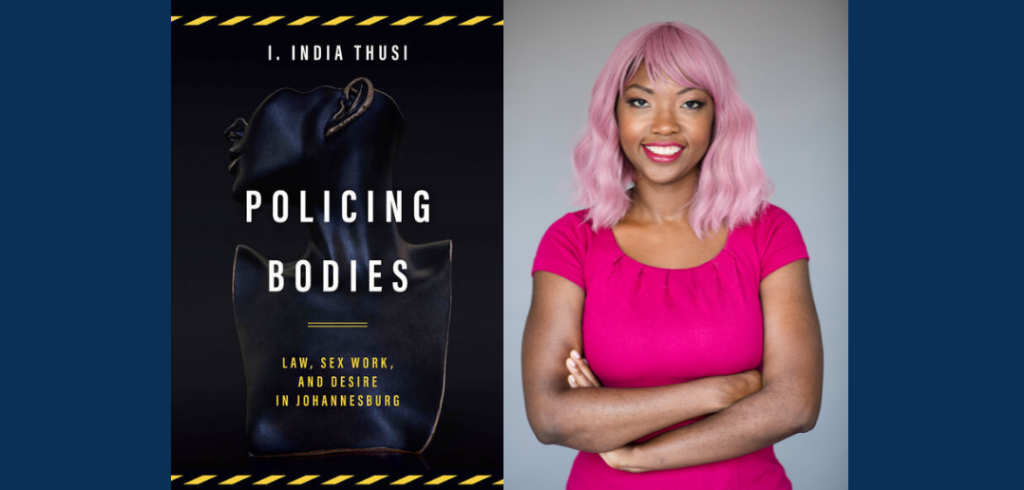On Nov. 30, The Leitner Human Rights Speaker series, hosted by the Leitner Center for International Law and Justice, invited Professor of Law at Indiana University Bloomington Maurer School of Law and senior scientist at the Kinsey Institute, I. India Thusi ’07, for its final event of the Fall 2021 semester.
Thusi discussed her forthcoming book, Policing Bodies: Law, Sex Work, and Desire in Johannesburg, which looks at racial and sexual hierarchies as they relate to policing, race, and gender in Johannesburg, South Africa, where she spent time conducting on-the-ground research and interviewing dozens of sex workers and police officers.
Origins at the Leitner Center
Thusi’s interest in the subject goes back to the Leitner Center and the time she spent as a Crowley Scholar visiting South Africa—where she later pursued a clerkship with Justice Johann van der Westhuizen at the Constitutional Court of South Africa, the country’s highest court.
Thusi explained that located next to the Constitutional Court was the neighborhood of Hillbrow, which was considered a seedy “den of iniquity” according to locals. “One day I decided I was going to explore it a little bit, and what I found was this really vibrant community,” said Thusi. Her interest piqued, Thusi knew she wanted to look at policing practices and decided to focus on sex work and criminalization in Hillbrow.
Using a mixed method ethnography and participant observations of both sex workers and police, as well as formal and informal interviews, Thusi’s research spanned years, during which time she lived in the affected neighborhoods, went on patrols with police who visited local brothels, and formed relationships with both sex workers and police.
What Thusi found was that there was an uneasy relationship between police and sex workers, raising interesting questions about human rights and criminalization. “What I’ve really been examining is to what extent policing is really just about maintaining the hierarchy and not so much about protecting and serving the public,” she said.
Sex Work in South Africa, From the Past to the Present Day
Thusi also provided a brief history of sex work in South Africa, which only criminalized sex work after feminists in the country campaigned on the issue during the Victorian era.
“What was interesting was that, of the 30 or so police officers I interviewed during the course of the study…almost all the officers supported decriminalization of sex work,” said Thusi. “Sex workers and police are portrayed as these really antagonistic actors, but at times, their goals were actually aligned.” Though sex work is criminalized in South Africa, the local police had decided not to enforce prostitution laws.
However, Thusi discovered that a hierarchy based on appearance did exist, with police viewing brothels with lighter-skinned and thinner sex workers differently compared to brothels with darker-skinned and larger women.
“The officers were expressing their admiration for the sex workers and it was this language of appreciation rather than disgust or disdain,” said Thusi. “There was more surveillance [in these environments], but at the same time, the sex workers at the least organized environments were subjected to kind of a benign neglect, ignored, or left alone to fend for themselves.”
In this way, said Thusi, the officers were “reinforcing this hierarchy that whiter is better and also worthy of more protection and more appreciation.”
Later on, police changed their approach and took on a method similar to “partial criminalization,” meaning that sex workers’ clients, not sex workers, would be criminalized. This ended up being “disastrous” says Thusi, and sex workers were actually more likely to be exposed to violence under this system.
After speaking to many sex workers Thusi found that women were having to make difficult decisions as safely as possible.
“These are women who are navigating and managing different risks” said Thusi, “One of the risks could be not being able to support their family.”
“Sex work has provided them a way to do it,” Thusi continued, adding that “having any form of criminalization or policing does seem to bring harm in their ability to do this.”
Policing Bodies: Law, Sex Work, and Desire in Johannesburg (Stanford University Press) will be published on December 21.

